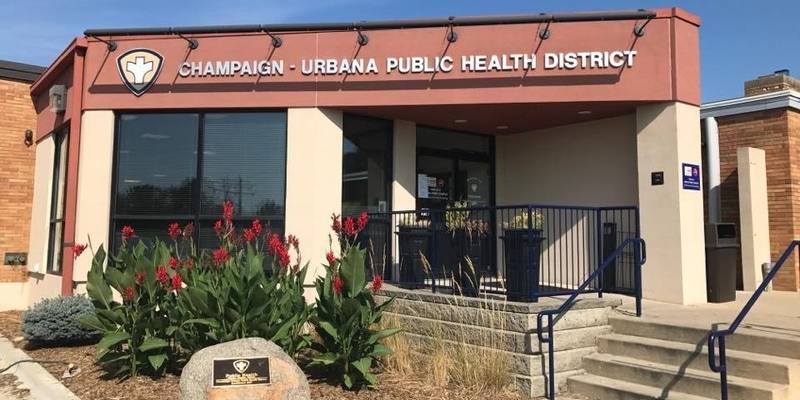In recent times, the Champaign-Urbana Public Health District (CUPHD) has mainly been associated with COVID-19 relief. While that service is highly valuable to the community, it is also important to recognize the variety of services provided by CUPHD that might go unnoticed. To discuss the role of the Maternal and Child Health division of CUPHD, I chatted with Valerie Koress, the Community Nutrition Program Coordinator. At this time, her role includes management of the WIC program (a supplemental nutrition program for pregnant and postpartum women and children), summer meals program, Give Back Garden, and building partnerships that address food insecurity and promoting healthy lifestyles. Koress highlighted that although many individuals in the community have never have never interacted with her agency, her work still provides for the community as a whole as well as those who specifically access her services.
“From monitoring water quality and food safety to administering vaccines for non-COVID-related diseases, we focus on whole community health and well-being with a heavy focus on disease prevention.”
The reason behind Koress’ passion for her work is the idea that the course of a mother’s pregnancy lays the foundation for a child’s health over their entire lifespan. According to 1000 Days, an organization about infant health, “How well or how poorly mothers and children are nourished and cared for during this time has a profound impact on a child’s ability to grow, learn and thrive.” Thus, Koress emphasized that CUPHD works to support women and their newborn infants through “wraparound services that address social determinants of health (food insecurity, housing, childcare, etc.), child growth and development, breastfeeding support, and more.” Knowing that so many have been hit by COVID-19, she says her goal is to support families in all ways during this crucial time.
Of the variety of programs CUPHD offers, the Special Supplemental Nutrition Program for Women, Infants, and Children (WIC) is a strong example of the benefits provided to the community by the Maternal Health Division. The program provides nutrition education and EBT-based benefits for specific foods that promote healthy pregnancies and infant/child development. As part of the certification process, participants receive a comprehensive nutrition assessment and subsequent education/counseling by nutrition professionals, many of which are registered dietitians.
In terms of income eligibility, WIC has a higher income cutoff than some other federal assistance programs. For example, a family of four can earn up to $4,040/month ($48,470 annually) and still qualify for WIC, whereas a family of four can only earn up to $3,603/month to qualify for Supplemental Nutrition Assistance Program (SNAP, formerly called food stamps). Koress also mentioned that all of the services and programs in the maternal health division have similar income eligibility guidelines, and participation in each program is voluntary. Overall, Champaign County WIC currently serves over 2200 participants, and is making efforts to be more accessible to eligible families in terms of locations and clinic hours.
Koress’ work focuses on supporting the basic needs of the future generation as well. The Division of Maternal & Child Health at CUPHD also provides services to children under the age of five. These programs are primarily WIC, Family Case Management, and GREAT start. GREAT Start focuses on child development and parent-child bonding, whereas Family Case Management focuses on family safety and referrals to other resources that address social determinants of health. They also offer vaccinations for children up to 18. While there are some related costs for those vaccinations dependent on different types of healthcare plans, they mostly serve Medicaid recipients who have no cost for this service.
It is also significant to note that there are some services the maternal health division provides that are not based on income eligibility: their milk depot and milk dispensary. As a milk depot, they accept breast milk donations from women who have been pre-approved for donation by The Milk Bank of Indianapolis. The milk is then shipped to The Milk Bank and tested, pasteurized, and redistributed to healthcare facilities that care for medically fragile infants, such as hospital NICUs. As a milk dispensary, they are able to dispense donor breast milk that has been tested and pasteurized to outpatient families. The goal of the dispensary is to increase infant feeding options when mother’s own milk is not available, and is primarily intended for short-term supplementation.
Koress also wanted to highlight how easy it is to apply for support from the Division of Maternal & Child Health. All someone has to do is give them a call to schedule an appointment. The USDA, who funds WIC at the federal level, has put special rules in place related to the COVID-19 pandemic that allow WIC clinics to conduct the certification process remotely (over the phone). Even with that convenience, new participants still need to come to the office for their first appointment to pick up their EBT card as those cannot be mailed. Still, after the initial certification appointment, many services will continue to be offered over the phone, even when pandemic waivers are no longer in place.
“In my opinion, WIC is easier than ever to access right now, and the pandemic waivers are in place through at least mid-August. Now is the time to enroll!”
To Koress, the main goal is to raise awareness about the vast array of resources provided by her division as well as the ease in applying to them. Koress’ core values seem to align with the statement that, “The work of public health affects every single one of us, whether we recognize it or not.”
To learn more specifics about resources from the Maternal & Child Health Division, visit https://www.c-uphd.org/maternal-child-health.html.








